Are you ready to free yourself of the trappings of everyday life and hit the open road with nothing but your courage, enthusiasm and determination?
Living in an RV full-time can be a liberating experience – giving you the freedom to explore new places and make new friends without having to worry about rent or mortgage payments.
In this blog post we’ll cover exactly how to live in an RV full-time, from finding the right home on wheels for your needs all the way through setting up a bank account so you have money coming in while living off grid. So lace up your hiking boots , roll up those tenting poles – let’s get started!
Table of Contents
Considerations for Full-Time RV Living
Costs
Before jumping into the RV lifestyle, it’s important to consider all of the costs associated with living on the road.
Things like fuel, maintenance and repairs, insurance and taxes can add up quickly so be sure you have a realistic budget in place before setting off.
The cost of your RV will be largely dependent on the type and size you choose, so be sure to do your research and pick the one that fits your needs.
It’s also important to factor in any potential costs for upgrades or modifications, such as solar panels or a generator.
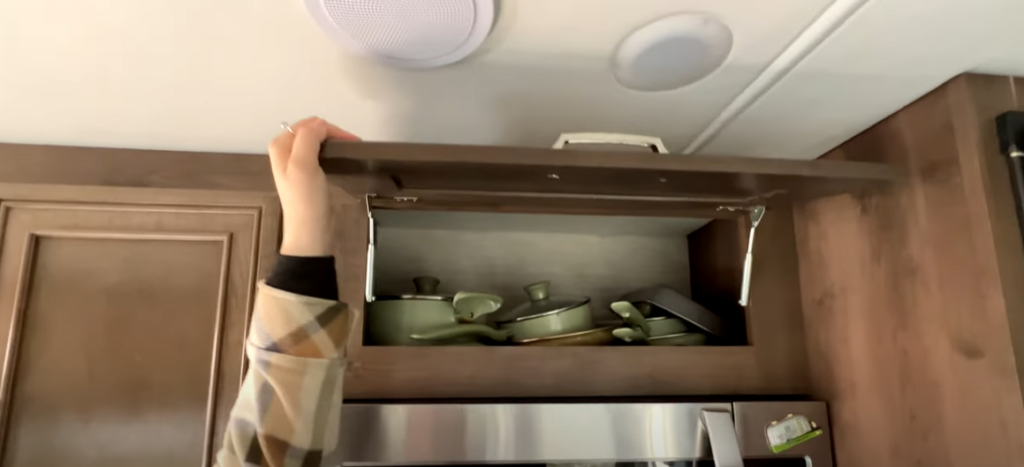
Living Space
When considering an RV for full-time living, it’s important to make sure the living space is large enough for your needs.
Make sure that you measure out the dimensions of both the interior and exterior so that you can accurately assess how much space you will have to work with.
Consider things like sleeping arrangements, storage, kitchen area, seating and bathroom setup; all of which will be important for comfortable full-time living.
Equipment
Once you’ve chosen the right RV, it’s time to make sure you have all the necessary equipment and supplies for a comfortable stay.
This could include kitchen utensils, bedding, camping gear and tools – but don’t forget to factor in room for personal items like clothing and electronics.
You’ll also need to consider installation of RV appliances, such as air conditioning and propane tanks – these are essential for full-time living, depending on the climate you choose to stay in.
Work and Income
Living in an RV full-time requires a reliable source of income; whether it’s from remote employment or an outside business venture.
Consider what kind of job you can do from the road, as well as any potential start-up costs for setting up shop on your own.
It could be worth looking into work camping opportunities. Many RV parks offer part-time job opportunities in exchange for a cheaper price to stay there.
Sell or Store
This step will likely depend on how much stuff you have; but either way, it’s important to consider what to do with your belongings before setting off in an RV.
If you’re ready to let go of most of your possessions and embark on the minimalist lifestyle, then selling or donating your items is a great option.
Domicile State
When you live in an RV, it is important to choose the state where you will register your vehicle. This is called the domicile state. Each state has different rules about how to do this.
You should pick the state that has rules that work best for you. This could include things like vehicle registration, income taxes, or insurance requirements – all of which will vary depending on the state.
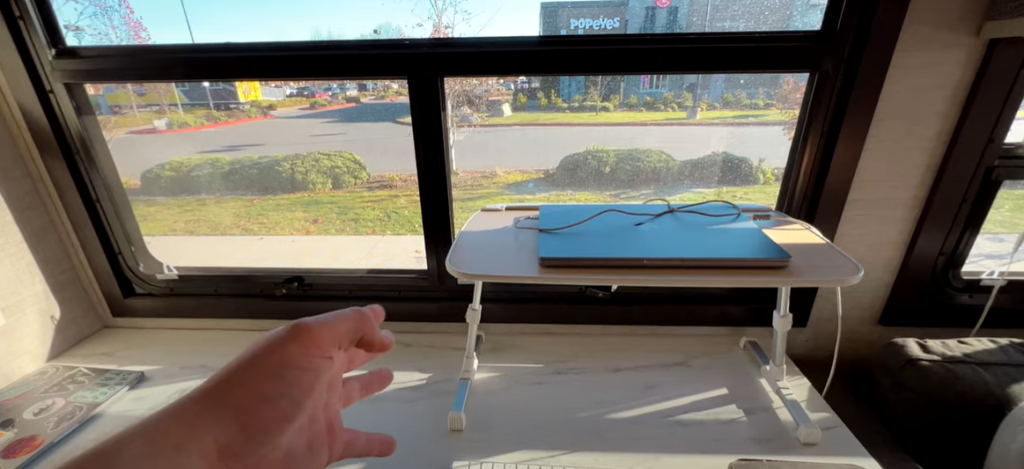
Insurance
Insurance is a must when living in an RV full-time. Make sure to read up on the different coverage options for both your vehicle and any belongings you plan to bring along. This can be done through online comparison sites or even by calling local insurance agents in the area of your planned travel route.
Schooling
Many RVers choose to homeschool their children while on the road. If this is something you’re considering, be sure to research the laws and regulations of each state you plan to visit and make sure your child will get a quality education.
If you want to live in an RV all the time, it is important to do some research and plan first. This way, you will be prepared for everything and have a great experience. Many people find this lifestyle very rewarding and it can even change your life.
Internet
Your RV can become a sort of home away from home, which is why it’s important to make sure you have access to reliable internet. Consider any potential mobile data plans or hotspots that are available in the areas you plan to visit.
There are also options such as satellite internet, which can be more reliable than relying on cell phone service. Make sure to read up on the different providers and compare prices before making any decisions.
Maintenance
It is important to make sure you stay on top of regular maintenance for your RV and any related equipment. Keep up with oil changes, check tire pressure regularly, and inspect for any potential wear and tear as you travel.
Depending on the type of RV you have, there may be other steps to ensure that everything is working properly. Be sure to consult your owner’s manual for regular maintenance requirements and have a professional look over the RV when necessary.

What to Look for in a Rig for Full-Timing?
When you’re shopping for an RV to use as a full-time home, there are certain features that can make your experience better. For starters, look for something with lots of storage space so you can easily store all of your belongings.
Additionally, think about features such as appliances, water capacity and quality of insulation – all of which can make your time on the road much more comfortable.
Size and Weight
When you are looking for an RV to live in, size and weight are two things that are important. Smaller RVs can move around tight spaces better and can go faster over long distances. But smaller RVs might not have as much space to live in or places to put things.
On the other hand, larger RVs may provide more space and features but can be difficult to manoeuvre. They are also heavier and will consume more fuel.
It’s important to consider how much time you plan on travelling versus stationary when deciding which size is best for you.
Appliances
Many people opt for RVs with kitchen appliances to make the process of cooking and cleaning easier. Choosing an RV with a refrigerator, stove, microwave and other basic kitchen equipment can make meal prep more efficient.
Layout
It’s also important to think about how the layout of the RV will work best for your lifestyle. Look at floor plans and consider which areas you will be using most often. Make sure there are places to store things and enough room for everyone to sleep comfortably.
Insulation
The insulation in an RV can make a huge difference in temperature control and energy costs. Make sure to choose an RV that is well insulated and has good ventilation. This will help you stay comfortable while living in your RV full-time and keep your energy bills low.
Tank Size and Quality
Water is important when living in an RV. Make sure the water tanks and plumbing are good quality. The size of the water tanks will determine how often you will need to refill them, and it’s important to check that all valves are working properly. [1]
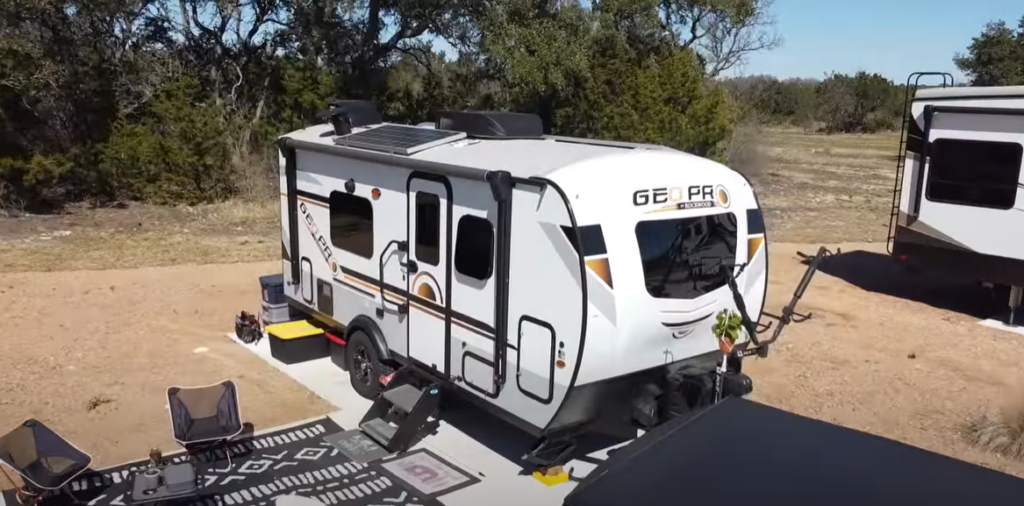
Other Features to Consider
Travelling Full-Time in Your RV
Once you have chosen the perfect RV, you can start your journey! Be sure to know any rules and regulations in the places you will be visiting. It is also important to plan ahead and look up places to stay overnight so you are not driving all the time.
Also, remember to budget for things like fuel, food and other expenses. And finally, don’t forget to enjoy your travels! Living in an RV full-time can be a great way to explore the world and see new places. Just remember to stay safe and have fun!
Visiting New Places
One of the great things about living in an RV full-time is that you can visit new places without having to pack and unpack. Many people love this opportunity to explore different parts of the country, each with their own unique culture and attractions.
While on your travels, keep an eye out for unique experiences such as National Parks, scenic drives or local events. You might even want to plan your route around the seasons so you can see different parts of the country in their full glory!
Staying Connected
When you’re living in an RV full-time, it can be hard to stay connected with family and friends. Fortunately, there are several ways to stay in touch with people without having to be stationary.
You can use apps such as FaceTime, Skype or Google Hangouts for video calls, and messaging apps like WhatsApp or Facebook Messenger for text messages. You can also invest in an RV-friendly wifi hotspot which will allow you to access the internet on the go.
Maintaining Relationships
It is important to stay connected with family and friends when you are living in an RV full-time. Make sure to schedule regular check-ins with people who are important to you, even if it’s just a phone call or video chat.
Consider joining a local RV club. You can meet other RVers who share your same interests. This is a great way to make friends, learn about local attractions and experiences, and even get help for any issues you may have with your RV.
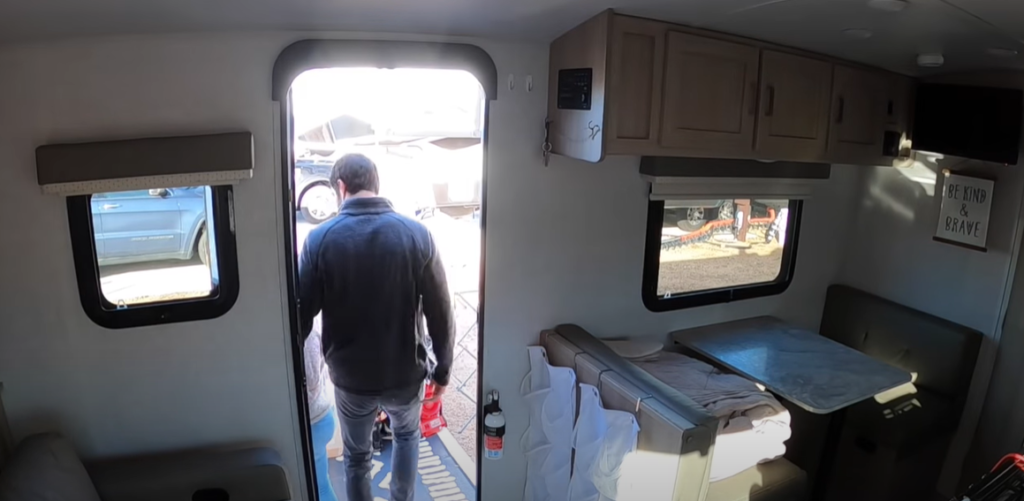
How to Live In an RV Full-Time?
Living in an RV full time can be a good experience. You can plan and prepare to make it a success! Choose the right size RV for your lifestyle. Look for features, such as appliances, insulation, and tank size that suit your needs.
Plan ahead for any issues that might come up. And don’t forget to stay connected and enjoy the ride!
Safety Tips
Living in an RV full-time can be a safe and enjoyable experience. Here are some tips to help you stay safe while on the road:
- Always know where you are going, including nearby places to restock or refuel.
- Stay aware of your surroundings and make sure that all doors and windows are locked when you’re parked for the night.
- Check the weather conditions before setting off and plan your route accordingly.
- Make sure to follow all laws and regulations while on the road.
- If you’re going to be staying in one place for a while, make sure your RV is secure and take measures to protect yourself from theft or other crime.
FAQ
Can you fully live in an RV?
Yes, many people live in their RVs full-time. As long as you have a large enough RV and the right amenities, you can make it your home.
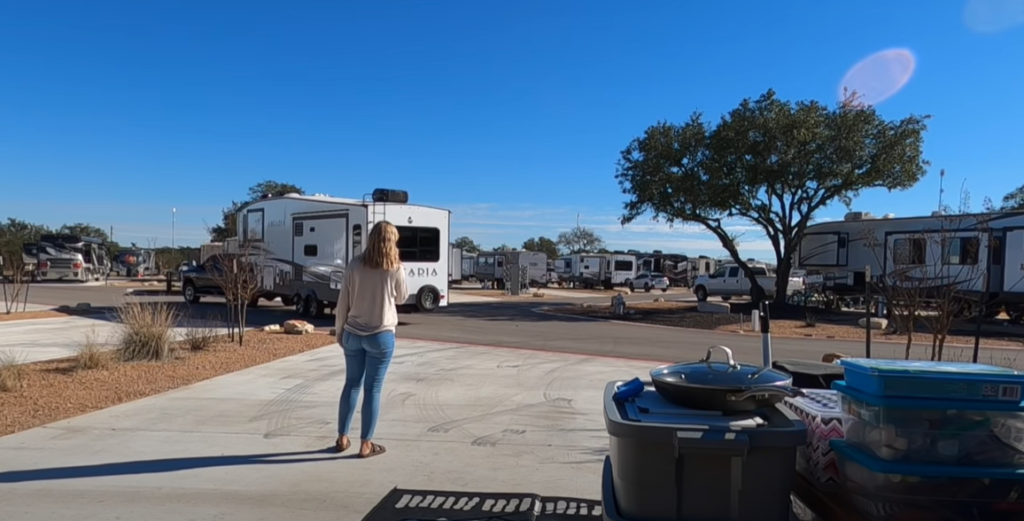
How do I stay connected while living in an RV?
There are apps you can use to talk to people and stay connected even when you’re not at home. FaceTime, Skype, and Google Hangouts are good for video calls. WhatsApp and Facebook Messenger are good for sending text messages.
You can also buy an RV-friendly wifi hotspot so you can get online even when you’re driving around.
What do I need to know before living in an RV full time?
It is important to plan ahead and research all aspects of living in an RV full time. Make sure you have the right size and amenities, such as appliances and insulation to suit your lifestyle.
Also plan for any unexpected issues that could come up while on the road. Lastly, make sure to stay connected with family and friends by scheduling regular check-ins with them.
What type of RV is best for a full-time living?
There is no one perfect RV for full-time living. It depends on what you need and want. Some things to think about are size, insulation, tank size, and appliances.
However, in general, you should look for an RV with plenty of storage space and enough room to comfortably live in. Additionally, if you plan on travelling a lot, you should look for an RV with good fuel economy.
Is RV life free?
No, living in an RV full time requires money for fuel, maintenance, and other costs. However, if you plan properly and budget correctly, it can be much cheaper than traditional housing.
Additionally, there are many campsites that offer discounts for long-term stays so make sure to take advantage of those when possible.
Is it financially smart to live in an RV?
Yes, living in an RV can be a financially sound decision. It is much cheaper than traditional housing and you don’t have to worry about things like property taxes or utility bills.
What are the cons of RV living?
The cons of RV living include having limited space and resources, being away from family and friends, and dealing with the weather. Additionally, it can be difficult to find work while travelling in an RV.
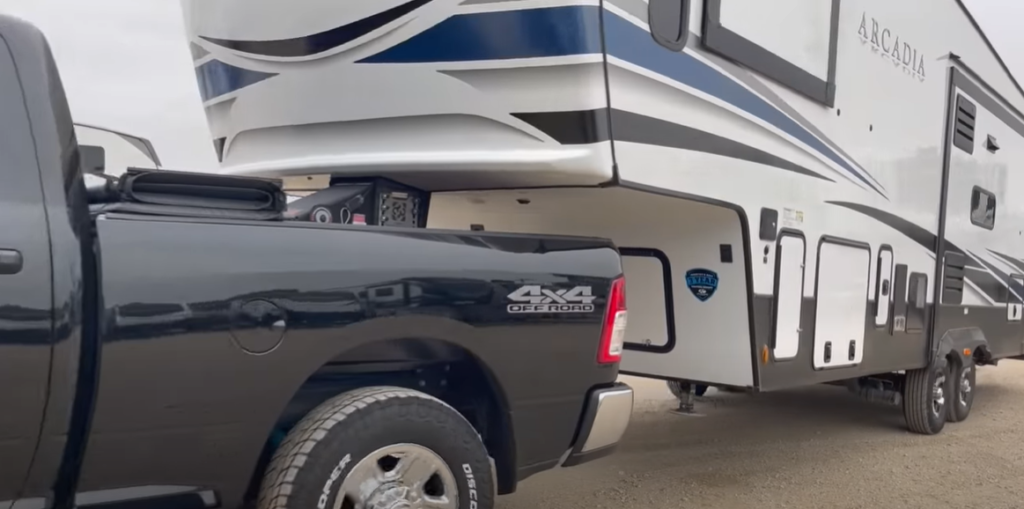
What are the pros of RV living?
The pros of RV living include being able to explore different places, having freedom and flexibility in your day-to-day life, being able to save money on housing, and having an adventure every day. Additionally, you get to meet new people and experience different cultures.
What safety precautions should I take while living in an RV full time?
It is important to stay aware of your surroundings and always know where you are going. Additionally, make sure all doors and windows are locked when you’re parked for the night.
Also, check the weather conditions before setting off and plan your route accordingly. Lastly, follow all laws and regulations when travelling in your RV.
How do I maintain my RV when living full-time?
You should take care of your RV often. This means checking the liquids, looking at the hoses and electrical connections, and putting oil on any moving parts. You should also keep your RV clean.
Do this by changing the oil, checking the brakes, and washing the windows. When you’re not using your RV, store it in a safe place where it won’t get damaged.
What other tips do you have for living in an RV full time?
You should plan your route and set goals. Make sure to take breaks, stay organised, and stock up on supplies. You should also be aware of the weather and plan for any hazards you might encounter. With these tips, you can have a safe and comfortable life in an RV full-time!
How do I stay connected with friends and family while living in an RV full time?
Staying connected with friends and family while living in an RV full time is important. Make sure to keep up regular communication, either through phone calls or video chats.
Additionally, schedule visits when possible and send postcards or letters telling them about your travels. Lastly, use social media to keep people updated on your travels.
Why should I live in an RV full time?
Living in an RV full time can be a great adventure and experience. You get to explore new places, meet interesting people, and have freedom and flexibility.
Additionally, you save money on housing costs while still having the comforts of home. All these things make living in an RV a unique and rewarding experience.
Why is RV living becoming more popular?
RV living is becoming increasingly popular for a variety of reasons. It is a great way to see the country, experience different cultures, and save money on housing costs.
Additionally, it can provide freedom and flexibility that you don’t get with traditional housing. Finally, with the rise of remote working opportunities, people are able to make money while travelling in their RV.
Does living in an RV full time require a lot of maintenance?
Yes, living in an RV full time does require a lot of maintenance. You need to check the liquids, hoses, and electrical connections regularly.
Additionally, you should wash the windows and change the oil often. Finally, when not using your RV, make sure to store it in a safe place where it won’t get damaged.
Do I need insurance for my RV?
Yes, it is highly recommended to get insurance for your RV. This can help cover costs if anything happens while you’re travelling.
Additionally, many states require you to have insurance when driving an RV. Make sure to check the laws in your area before setting out on the road.
Does living in an RV full time require a special license?
No, living in an RV full time does not require a special license. However, you may need to obtain a Non-Resident Driver’s License or International Driving Permit depending on the country you are travelling in.
Additionally, some states will require you to register your RV and obtain a special license plate. Make sure to research the laws in your area before setting out on the road.
What other documents do I need when living in an RV full time?
Along with your driver’s license, you should carry other important documents such as your vehicle registration, proof of insurance, and a map of the area.
Additionally, it is recommended to keep vital records such as birth certificates or passports for yourself and any members of the household.
Is it possible to work while living in an RV full time?
Yes, it is entirely possible to make a living while travelling in your RV. With the rise of remote working opportunities, more people are able to make money from anywhere with an internet connection.
Additionally, you can look for temporary jobs or freelance opportunities along the way. Finally, some places offer RV camping discounts for those who are working.
How can I stay safe while living in an RV full time?
Staying safe while living in an RV full time is important. Make sure you have a first aid kit and emergency supplies on hand at all times.
Additionally, read up on the laws of the area before travelling, and be sure to follow all safety regulations while driving. Finally, let someone know when you’re travelling and where you’ll be staying so they can check in on you from time to time.
Can I keep people updated on my travels?
There are some ways that you can let people know where you are when you travel. You could make a website or blog and post updates often.
Or, there are apps that let you share your location with people who care about you.
Another way is to use Instagram or Facebook to post pictures and updates of your trip.
Are there any discounts for RV living?
Yes, there are some discounts available for those who live in RVs full time. For example, some campgrounds offer discounted rates if you stay a certain number of nights or pay in advance.
Additionally, some gas stations and rest stops offer discounts to RVers. Finally, many states have RV-specific parks and campgrounds that offer discounts for RV living.
When living in an RV full time, what types of clothing should I bring?
When living in an RV full time, it is important to invest in lightweight and compact clothing that can be layered. Additionally, you should bring items such as rain gear, a hat, and sun protection.
Finally, make sure to pack versatile pieces that can be dressed up or down depending on the occasion.
Which type of RV is best for full-time living?
The type of RV that is best for full-time living depends on your needs and preferences. If you are planning to stay in one place for a while, then a Class A motorhome or trailer may be the better option.
On the other hand, if you plan to travel extensively and camp in different locations, then a smaller Class B or C RV may suit you better.
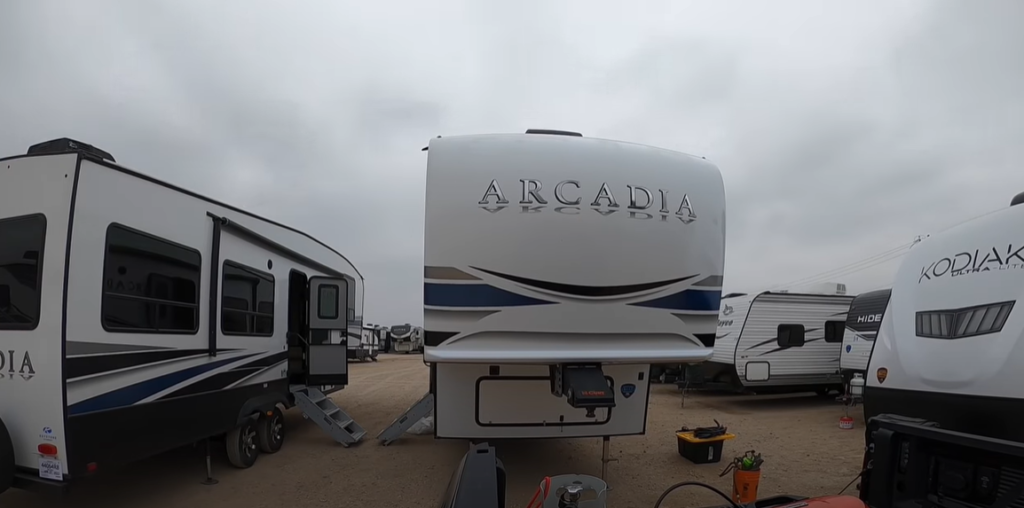
Do I need to pay taxes when living in an RV full time?
Yes, you are still required to file income taxes when living in an RV full-time. However, it is possible to reduce your tax burden by taking advantage of special deductions for RV owners.
Additionally, there may be other tax savings available depending on the state and local laws in which you are residing. Be sure to consult a tax professional for more information.
Do I need to have health insurance when living in an RV full time?
Yes, it is recommended to have health insurance when living in an RV full time. Depending on your current situation, there are a variety of plans available through private insurers or the government such as Medicare or Medicaid.
Additionally, some states offer special health care programs for RVers and may be a good option for those travelling full time.
Does living in an RV full time require a lot of maintenance?
Yes, living in an RV full time does require some maintenance. Regular inspections should be done to check the tires, brakes, and other components.
Additionally, you may need to replace certain parts more often due to the wear and tear of travelling on different roads.
Finally, make sure you know how to do basic repairs or have access to a mobile RV service in case of emergency.
How often should I have maintenance done on my RV?
It is recommended to have your RV serviced once a year, or every 6 months if you are travelling extensively. During these inspections, mechanics will check the tires, brakes, and other components of your RV.
Additionally, they should look for any signs of wear and tear that could lead to an issue down the road. Following a regular maintenance schedule can help ensure your RV stays in tip-top shape and is safe on the roads.
How long can I stay in one location when living in an RV full time?
Most RV parks do not have a limit on how long you can stay, but some may have restrictions.
For example, some parks may only allow you to stay for a certain number of nights in a row or they may require that you take a break for a minimum number of days between stays. Make sure you check the policies at each RV park before making any plans.
Are there any special rules for living in an RV full time?
Yes, depending on where you are living, there may be certain rules and regulations that apply. For example, some states require a minimum length of stay or have restrictions on how many people can live in one RV.
Additionally, some local ordinances may need to be followed, such as noise levels or parking restrictions. Make sure you are aware of all the rules and regulations that apply before moving into an RV full time.
Is there a way to save money when living in an RV full time?
Yes, there are plenty of ways to save money when living in an RV full time. For starters, you can take advantage of RV parks and campgrounds that have weekly or monthly rates.
Additionally, many states offer discounts on camping fees for senior citizens or military personnel. Finally, there are also ways to reduce your expenditure with budgeting tips and shopping around for the best deals.
When living in an RV full time, where can I get my mail?
When living in an RV full time, it is important to have a secure address to receive your mail. You can use a post office box, or you may be able to ask family or friends if they will accept your mail for you.
Additionally, some RV parks and campgrounds offer mail forwarding services, so check with them to see if they can help.
What other amenities do I need while living in an RV full time?
Living in an RV full-time requires a few extra amenities that will help keep you comfortable on the road. This includes things like towels and linens for your bed, a generator for electricity, and an air conditioner to keep you cool in the summer.
Additionally, any necessary cooking supplies and tools should be included as well. Finally, make sure you have access to a good internet connection and cell phone service for communication.
How can I make sure my RV stays in good condition while living in it full time?
There are a few things you can do to keep your RV in good shape. First, follow the regular maintenance schedule that is outlined by your manufacturer or mechanic.
Additionally, take steps to protect your RV from the sun and rain by using awnings or tarps. Finally, keep your RV clean and free of debris by vacuuming regularly and removing any mould or mildew.
Useful Video: 5 Things to Know About Full Time RV Living (Brutally Honest!)
Conclusion
With a few minor adjustments, living in an RV can be full-time comfortable for many people. It is important to do your research before you purchase an RV and make sure that it has everything that you need in order to live comfortably.
You should also consider the climate that you will be living in and whether or not the RV will be able to withstand the weather conditions.
If you take these things into consideration, then you will be well on your way to enjoying all of the benefits that come along with living in an RV full-time!
References:
- https://togorv.com/rv-living/guide-to-full-time-rv-living/

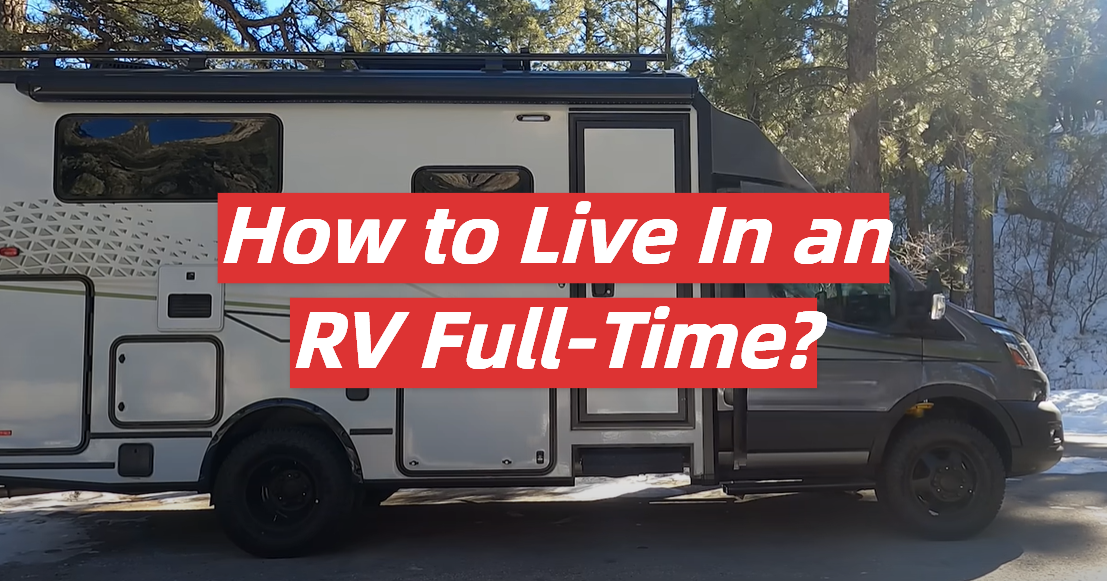
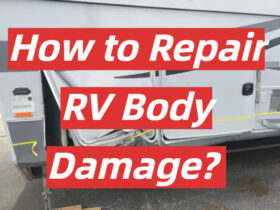
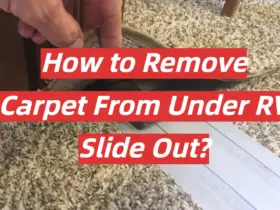
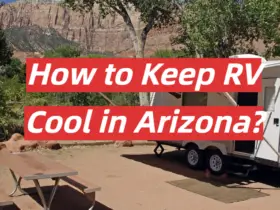
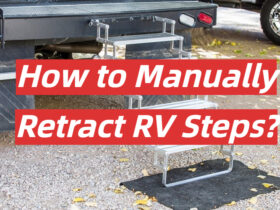
Leave a Reply